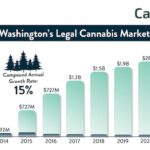Sessions Punts Cannabis Question on Capitol Hill

Cannabis in America: The Tipping Point?
January 5, 2017
Washington’s Legal Cannabis Market
January 12, 2017By J.J. McCoy, Senior Managing Editor for New Frontier Data
Ever since president-elect Donald Trump nominated U.S. Sen. Jeff Sessions (R-Ala.) two months ago to serve as U.S. attorney general in the new administration, the mood within the cannabis industry has ranged from puzzlement to paranoia.
But given how outspoken an opponent Sessions has long been against marijuana (claiming to be “heartbroken” after President Obama compared its risks favorably to alcohol), and declaring flat-out that “good people don’t smoke marijuana”), a takeaway from last week’s Senate confirmation hearings suggests that there may be more good news from what he didn’t say than bad news in what he did.
Throughout his daylong testimony on Jan. 10, Sessions offered some hints as to how he may clash with current Department of Justice policy on various issues, including marijuana, but refrained from putting producers on notice.
Even if basically ignoring the reality that more than 1 in 5 Americans now live in states where adult use has been mandated, and more than 6 in 10 live in states having legalized medical use, Sessions reminded that “Congress has made the possession of marijuana in every state and distribution of it an illegal act.” Otherwise he kicked the can up the street to Capitol Hill, adding that “if that is something that is not desired any longer, then Congress should pass a law to change the rule.”
And while he predictably promised to be a dutiful foot soldier (“it is not so much the attorney general’s job to decide what laws are enforced”), he also struck a chord of pragmatic resignation by noting that the department’s prosecutorial priorities boil down to “a question of resources” about going after taxpayers in states where marijuana use has been formally adopted.
In Florida alone, 2 million more voters last fall favored medical marijuana than voted for Trump, as is the case with a majority of Americans polled nationwide.
Nevertheless, for however long they lack any formal protection passed by Congress, every grower and dispensary who now pays taxes within the legalized adult use industries of Alaska, California, Colorado, Oregon or Washington, respectively, remains exposed to criminal prosecution by a Sessions-led DOJ. As will those soon coming on-line in Maine, Massachusetts and Nevada where adult use measures passed last November.
In fact, without clear leadership and simplified policies for the cannabis industry, contends Colorado-based attorney Bob Hoban and New Frontier advisor, “hundreds of thousands of jobs will be lost, and millions of dollars in U.S. government funds will be wasted in uncoordinated and directionless bureaucratic agency action.”
Meanwhile the last line of defense for the industry well may be Sessions’ boss. Trump is on the record in support of medical use, and in favor of letting states decides for themselves. He is also a self-described “friend for life” with billionaire venture capitalist Peter Thiel, who became a member of Trump’s transition team after having invested $1.5 million into the campaign. Of course, two years ago this month, Thiel’s Founders Fund also happened to become the first institutional investor in the legal cannabis industry after sinking a “multi-million” participation into Privateer Holdings’ $75 million fundraising effort.
More recently Thiel has been credited in pushing for candidates as Trump’s nominee to head the Food & Drug Administration. Jim O’Neill is Thiel’s managing director at Mithril Capital Management, and entrepreneur Balaji Srinivasan works at the Andreessen Horowitz venture capital firm. Both met with Trump Jan. 12 to discuss the position.
In a televised interview following Sessions’ testimony, Trump’s appointee for White House press secretary, Sean Spicer was asked whether the president-elect’s stances weren’t in “diametric opposition” to Sessions’.
“I think there’s genuine concerns about how our country — and how our young kids, in particular — have handled drugs and alcohol, and it’s something that we’ve got to be careful with,” Spicer replied. He added, however, that “when you come into a Trump administration, it’s the Trump agenda that you are implementing, not your own. And I think that Sen. Sessions is well aware of that.”
Perhaps the first indication of how Trump regards adult use will be seen as early as Friday, when local adult use advocates in Washington, D.C., have announced plans to legally hand out 4,200 free joints to Inauguration Day visitors in the area of the National Mall, whereas federal property it’s illegal to smoke one.

J.J. McCoy
J.J. McCoy is Senior Managing Editor for New Frontier Data. A former staff writer for The Washington Post, he is a career journalist having covered emerging technologies among industries including aviation, satellites, transportation, law enforcement, the Smart Grid and professional sports. He has reported from the White House, the U.S. Senate, three continents and counting.




